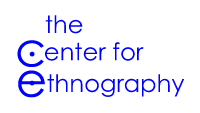
an
interdisciplinary
campus center
"Ethnography by Design" 10/21/08
A Conversation with Paul Dourish, Professor, Informatics at UCI; Chris Kelty, Information Studies, UCLA; and George Marcus, Director, Center for Ethnography
A Brief Report and a Reflection on the “Ethnography by Design” Event, October 21, 2008
George E. Marcus, Director, Center for Ethnography
The first in a series of noontime conversations exploring the relationship of ethnographic modes of inquiry and design processes was held on Tuesday, October 21, with approximately 80 faculty and students in attendance, representing UCI, other campuses such as UCLA, and programs in anthropology, planning, the arts, and information/computer science.
The event opened with a conversation between Paul Dourish, of informatics and computer sciences at UCI, and Chris Kelty, of information studies at UCLA, with me moderating. Paul discussed how his longstanding use of ethnographic methods could be enhanced by thinking of them as a design process, and Chris discussed the ways in which design thinking, especially in the development of the open software movement, shaped his innovations in teaching fieldwork to graduate students during his years in the Anthropology department at Rice University. The idea of design in this opening discussion derived mainly from its meanings in informatics and IT, and was shaped by the intention of reimagining ethnography as a mode of inquiry, especially in graduate training.
After about a half hour, the conversation naturally opened to the room with a wide-ranging set of exchanges and the expression of interests incorporating other arenas, such as urban planning, architecture, conceptual and performance art, graphics and product design, in which design as a pedagogical and continuing practice have been important. In fields where design pedagogy and studio methods are the norm, ethnographic modes of inquiry stand for a way of leavening them, opening them continually to other relevant social and cultural contexts; for contemporary ethnography, rethinking traditional modes, such as fieldwork and participant observation in terms of design and studio processes, allow for more complex understandings of them as they are applied to new objects of study and in a changed politics of engagement.
The Center for Ethnography will organize at least three more events during the course of this academic year to develop the broad theme of this first event. Each event will follow the same conversational format. They will explore other arenas of design practice, and will take off from specific research and teaching projects. Consistent with the purposes of the Center, the tendency will be to put more weight on the question of how design modes might reimagine ethnographic inquiry rather than how ethnography provides understandings of design processes or participates within them. However, such a distinction will tend to collapse or resolve during our discussions--and desirably so.
In concluding, I might suggest what is at stake for ethnography, as developed within the anthropological context over the past two decades as a mode of critical inquiry, in thinking of it in terms of design practices. In graduate training especially, but also more generally, ethnographic research is mostly composed of projects of individual conception and execution about defined cases. Yet, virtually everything in the milieus and terrains of ethnographic research today from conception to reporting of results pulls a project into collaborations, collectivities, institutional arrangements and networks of various kinds that are not simply its objects, but are also integral to the process of making knowledge out of the traditional individual case-bound process of fieldwork. Design processes, in their various genres, conceive of inquiry in a way that provides the long view, encompassing the phases of research today in a coherent way, retaining the focus on individual performance while incorporating the complex relations that compose ethnography and making them visible and accessible to the professional community. I am not thinking of the idea of formal research design here, but of design as it is defined in studio fields, where theory, practice, results, and effects are mutually examined and played out.
In the design processes with which I am familiar, the individual and collective as agents of knowledge production are constantly in play. There is conceptual and practical rigor in the application of ideas. There is reporting and constant feedback by diversely-composed audiences from beginning to end. The final result of ethnography would effectively have multiple accountabilities which are thought about through the entire project, so the final result would not be final, at least conceptually—there is an ideology to design of open-endedness and of a work offering solutions to problems that are subject to revision by later and other work. Theory, elegance, aesthetics, and effects are practical matters in ways that they are not components of the way ethnographic research is presently shared and communicated.
Ethnographic research today rethought as a design process would encompass and preserve classic fieldwork, perhaps still as a core modality. It would, however, both relativize its functions and blur its beginning and end in conceiving it within the broader contexts and politics that so much ethnography now involves. This would lead to three other issues, only mentioned here: incompleteness as a norm, or even theorem, at least of the dissertation phase of an ethnographic project; the more complex role of collaborations in producing individual projects; and the more formal or conceptualized incorporation of receptions of the project into its design and doing.
…So, ‘ethnography by design’ as a Center agenda will emerge repeatedly within the wide-ranging discussions of future sessions of our series. As such, one primary motivation of the series is to use the characteristics of design thinking and practices in their various genres as both a resource and inspiration in the reimagination of ethnographic inquiry, challenged by the contemporary terrains in which its curiosities and ambitions are leading it. These events are thus experiments, and in terms of this agenda, one key function of the conversations is to prevent design processes from being idealized while they are thought through and applied to key problems of the doing of ethnography today. And vice versa.



